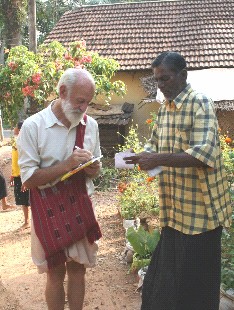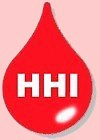News from India by Edmund Plummer

Three of us went out to India from January 12th to 21st - Ron, Eddie Donald and myself. We had an extraordinarily varied and busy time. We reviewed our present projects, and saw several worthwhile proposals that we would like to be involved in at some stage in the future. I can mention only some of them here - the rest will have to wait for the next issue.
As always in India, the needs are overwhelming; but we can rejoice that we are making a huge difference to many lives - hundreds of people are benefitting from your generosity.
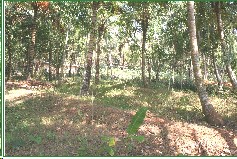
One of the main objects of our visit was to purchase some land for Pastor Anthony’s home for abandoned children. He currently has ten living with him and his family in their cramped four-roomed house; the landlord does not know what he is doing, and will probably evict them when he finds out.
After some initial problems, Anthony identified an excellent plot of land, slightly sloping with lots of trees, of over 800 square metres (a fifth of an acre) and we are in the process of buying this. We have designed a building which will allow up to 16 children to be accommodated separately from Anthony’s family; the building will also meet government regulations and allow the home to be officially registered, something that is impossible with the present house.
Newport scouts have been hard at work over the last year, and they have done a splendid job of raising funds - they have already raised more than enough to pay for the land, and they are in the process of raising more money to pay for the building. Land values and labour charges are rising steadily in Kerela, so this will also be an excellent investment for the future.
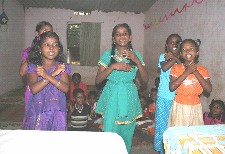
Another delightful aspect of our visit was a visit to Pastor Bovas’s orphanage. As is often the case in India, the term “orphanage” is used loosely - many of the children have at least one parent alive, but the parent is unable to look after them for one reason or another. A number of you are contributing towards the cost of this orphanage. We were welcomed with a song, and then a delightful dance routine by five of the girls, which had been choreographed by one of them. After some more songs we were introduced to the children, 18 in all, of whom quite a few had changed since our last visit. We were then treated to a meal with the family. We were left with a clear impression of a well-run little orphanage with happy children.
One of the children, Kartic, is very intelligent. Pastor Bovas would like to send him to a private, English-medium school if this is possible, so as to give him the best possible start in life.
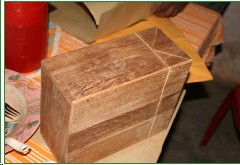
Pastor Bovas also proposed setting up a co-operative making paper bags. The photo shows the wooden blocks around which paper is wrapped and scored along the slots for easy folding and as Kerela has recently restricted the use of plastic bags, this creates an opportunity to create employment for poor people. He has a well-thought out scheme for training about 30 women.
We discussed this in detail and agreed some improvements. We are hoping to give the go-ahead shortly. If the project is a success it could be repeated in other villages where there is crippling poverty, either producing more paper bags or other things.
We are increasingly getting involved in the provision of seed money for small businesses. Last year we gave seven women in Colachel (a Tsunami affected town) 1,000 Rupees (£12) each to set up a small business. Although we were not able to visit the area, we were told that two of these have been successful.
A little business that we did visit was one making paper bags out of newspaper, which Pastor Rajan’s wife started with 100 Rupees that we gave Pastor Rajan. This provides employment for three women. Whilst they don’t make much money, it is better than nothing.
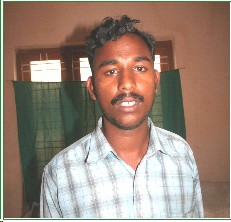
We met Manu Kumar, a young man, who has heart and back problems and diabetes which means that he cannot do hard work. He was bright and seemed to have a reasonable business sense, so we were able to provide him with a small shop. We also left behind some money so that other small businesses can be started up.
Whilst we were in Trivandrum, we were able to revise the arrangements for providing medicines, immunosuppressant / anti-rejection drugs in particular, for several patients. These drugs cost over £100 per month for 30 months, and are way beyond what most people can pay. We had agreed to provide them for a very limited number of people; due to a misunderstanding, the number had been increased to beyond the level that we can afford. We have now agreed a better system, in which a small committee, composed of medical staff and the people that we work with, will decide who gets what strictly on the basis of medical need, the patients’ ability to pay, and our ability to provide funds. We also took the opportunity to agree a similar arrangement for helping with drugs for children with various problems.
You help hundreds of people in ways that are too small to mention. Every morning Tom has a queue of people who have walked miles to see him. Most will have seen a doctor (which is free under the Indian health service) and been given a prescription but cannot afford the medicines prescribed. The cost is probably less than a pound in our terms, but they have nothing. Tom has time for them all; he gives them a short handwritten note to a pharmacist with whom he has an arrangement, letting them have their medicines for free. The poorest also get a note for a kilo of rice, or a few pence for their bus-fare. They all get a prayer.
Walking anywhere with Tom is a slow process; every few yards he is stopped; a medical history is produced; a prescription is checked; another note is written; and another prayer is offered. We could then walk maybe fifty yards before the process is repeated. Tom never tires of people. As Jesus walked around doing good, so does Tom. Your contributions make this possible.
